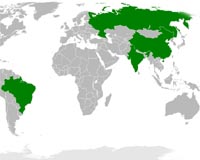 |
Boten, Laos (AFP) May 18, 2011 The language is Chinese, change is given in yuan and the time is set for Beijing -- but the Boten casino is in Laos, not China. This impoverished country is overrun by investments from the more powerful neighbours that surround it, and is struggling to impose a development strategy. The casino and garishly-coloured hotels have been developed in Boten over the past five years, against a backdrop of mountains a stone's throw from the Chinese border. Laotians are not welcome in this Chinese-controlled new town, which is far from the only example of China's widespread presence in this landlocked communist country of about six million people. The Chinese projects are on a large scale -- mines, dams, a high-speed rail project, agricultural concessions -- and have led to concerns in the small nation. "The Chinese presence is on everyone's lips. It's a subject which Laotians have started to talk about increasingly overtly and more critically," said a Laos-based foreign expert. China, and also Vietnam and Thailand, "use Laos as an extension of their territory", agreed Dominique Van der Borght, of Oxfam Belgium in the Laotian capital Vientiane. Long reliant on foreign aid, Laos is now the subject of massive foreign investment. According to official figures, the inflows rose from $51 million in 2001 to $13.6 billion last year, led by the three neighbouring countries with more than $8 billion in 2010. Those figures can only rise further with the announcement of new projects including the country's first full-length railway, from Boten to Vientiane. Construction of the $7 billion line, largely financed by Chinese firms, has not yet begun but plans call for completion by 2015. At first glance Laos, one of the world's poorest nations, should welcome this investment. But Rio Pals, coordinator of INGO Network which groups more than 70 humanitarian organisations in Laos, expressed concern about the government's ability to properly manage the huge influx of money. "They don't have the capacity at this moment to check at the door whether it is quality investment," she said. Laos officially grew at 7.9 percent between 2006 and 2010, an expansion largely founded on exploitation of natural resources in the country, which has no industrial output. "Forests, agricultural land, water and hydropower potential, and mineral resources comprise more than half the country's total wealth," says a World Bank report. Care must be taken "not to saw off the branch on which Laos sits," says the foreign expert. Laos is a rural-based society and some experts fear that its people, who depend on the country's forests and waters for sustenance, are paying for their country's growth model. Pals says the country's goal of advancing from least-developed nation status by 2020 might be affected unless there is a system to ensure good-quality investments that benefit the entire population. Some analysts, though, say the 2020 target seems reachable. At its five-yearly congress in March the ruling communist party confirmed this aim of escaping the ranks of the world's 48 poorest countries. "The bet is not impossible to win" given recent economic growth rates, said Vatthana Pholsena, of Irasec (Research Institute on Contemporary Southeast Asia), in Singapore. "But the question is not only a matter of accumulating wealth. It has to be equitably distributed." The World Bank encourages Laos to rely on its resources, but prudently. "With appropriate macroeconomic and governance priorities, Laos' natural resource wealth can contribute to rapid, sustainable growth and poverty reduction," the bank said in its latest report on the country. The authorities need to find a way to control investments without closing doors to them. They also need to accept that rapid growth will bring unavoidable changes to society. While some foreign aid workers romanticise traditional mountain village life in northern Laos, rural people themselves want to see change, says Adrian Schuhbeck, of the German development agency. "Preservation of traditions should be promoted but not at the cost of a reasonable access to modern goods for communities in cold mountain areas," he said. "Polyester blankets coming from China can really improve their life although these are not part of their traditional lifestyle."
Share This Article With Planet Earth
Related Links Global Trade News
 Travel industry looks to China, India, Brazil for boom
Travel industry looks to China, India, Brazil for boomLas Vegas (AFP) May 17, 2011 China, India and Brazil are poised to fuel an explosion in international tourism in the coming years, showering money and jobs on countries ready for it, and trouble for those that aren't, industry leaders say. With an estimated two billion new middle class consumers expected to come into the markets from those emerging powerhouses over the next two decades, the travel industry sees a potent ... read more |
|
| The content herein, unless otherwise known to be public domain, are Copyright 1995-2010 - SpaceDaily. AFP and UPI Wire Stories are copyright Agence France-Presse and United Press International. ESA Portal Reports are copyright European Space Agency. All NASA sourced material is public domain. Additional copyrights may apply in whole or part to other bona fide parties. Advertising does not imply endorsement,agreement or approval of any opinions, statements or information provided by SpaceDaily on any Web page published or hosted by SpaceDaily. Privacy Statement |